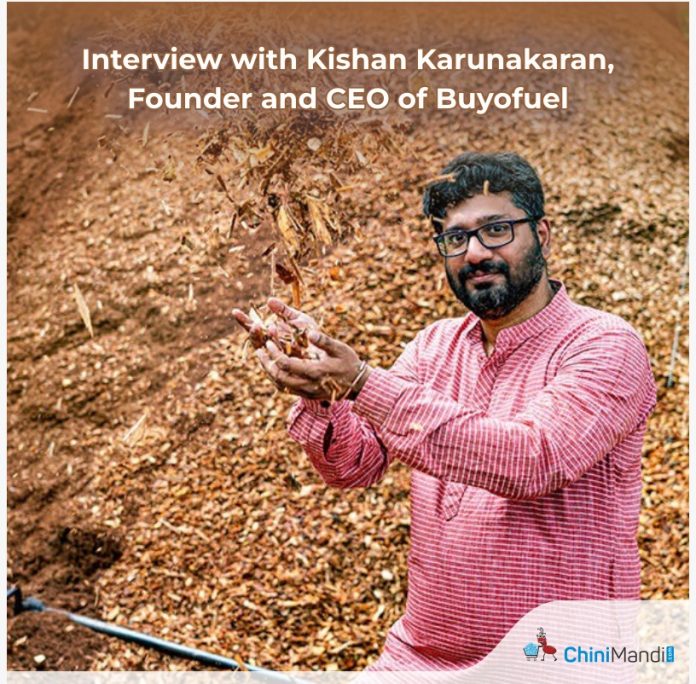Kishan Karunakaran, founder and CEO of Buyofuel, is at the forefront of revolutionizing B2B transactions within the biofuels and organic waste markets. With over 16 years of industry experience, he recognized a significant gap: the absence of a dependable platform to connect stakeholders. This insight led to the launch of Buyofuel, India’s online marketplace for biofuels and waste management. Committed to leveraging innovative technology and ensuring transparency, Buyofuel seeks to streamline the supply chain and foster collaboration among stakeholders, promoting access to sustainable energy solutions. In an interview with ChiniMandi, Karunakaran shares insights into how the company is advancing the biofuels market and its future prospects.
Q. What inspired you to create Buyofuel, and how has the company evolved since its inception?
The idea for Buyofuel emerged from a deep understanding of the challenges in the biofuel industry. I’ve been involved in the biofuel sector for over 16 years, running biodiesel plants, consulting biodiesel projects and enhancing supply chain optimization. During this time, I noticed the industry lacked a reliable and accessible platform to connect waste generators, biofuel manufacturers, and consumers. The supply chain was fragmented, making it difficult for these stakeholders to collaborate efficiently.This realization drove me along with the other co-founders, Sumanth kumar, Venkat Selvan, Prasad P Nair, heading the marketing, IT and the customer relation & project departments respectively, to create Buyofuel, India’s first online marketplace for biofuels and waste. We aim to simplify the process, ensuring seamless transactions between raw material suppliers, manufacturers, and end-users, while democratizing green fuels for a sustainable future.
Q. Can you explain how Buyofuel’s platform works, including transaction processes?
Buyofuel’s tech-driven approach revolutionizes B2B transactions in the biofuels and organic wastes market. With end-to-end digitization, our platform ensures transparent, secure, and quality-assured processes. From initial inquiry to product viewing, order placement, payment, and doorstep delivery tracking, Buyofuel employs advanced technologies for a seamless experience. Buyofuel operates on a transaction-based business model. The platform connects buyers and sellers in the biofuels and organic wastes sector, facilitating B2B transactions. Revenue is generated through trading margins on transactions conducted on the platform. Both biofuel manufacturers and fuel-consuming businesses, acting as users on the marketplace, contribute to these trading margins. Buyofuel aims to provide a transparent, efficient, and technology-driven solution to streamline the sourcing and trading of biofuels and organic wastes, creating value for all stakeholders involved in the supply chain.
Q. Traditionally, fossil fuel supply has been consistent and organized in India—how does biofuel supply compare? What are you doing to ensure smooth operations?
Biofuels sector in India is fragmented and unorganized. Biofuel supply chain faces unique challenges including variability in feedstock availability, limited production infrastructure and a dispersed supplier network. Buyofuel addresses these challenges with the help of the tech platform that we have built to connect the diverse network of suppliers with buyers ensuring a steady supply. Buyofuel has built partnerships with multiple suppliers across multiple regions creating a supply chain that can adapt to the fluctuation in the resource availability. Buyofuel also handles a vast range of products to reduce the dependency on any single resource. Buyofuels with its promise to adhere to the quality of resource in demand are thereby able to ensure smooth operation irrespective of the challenges posed by this sector.
Q. What steps are Buyofuel taking to boost biofuel production in India and transition major fuel consumers to biofuels?
Buyofuel actively works to accelerate biofuel adoption and production through initiatives aimed at both supply and demand. On the supply side, it partners with waste generators to source feedstock for biofuel production, thus enhancing resource availability and reducing waste. For demand generation, Buyofuel collaborates with large corporations, providing tools like sustainability dashboards that track emissions reductions, which align with corporate ESG goals. Additionally, Buyofuel contributes to rural economies by integrating more than 5000 metric tons of agricultural residues into the biofuel supply chain, directly supporting a sustainable, circular economy .
Q. How does Buyofuel manage large quantity orders while maintaining quality, and is there a cap on minimum or maximum supply?
Buyofuel is designed to handle orders of varying sizes while maintaining quality. Its marketplace model includes a built-in quality assurance system, with biofuels certified by NABL-accredited labs to meet quality benchmarks. This ensures that regardless of order scale, quality remains consistent. For order management, Buyofuel leverages technology to provide real-time tracking, secure dispatch, and monitoring capabilities, allowing transparency from order placement to delivery completion. While there isn’t a strict cap on order sizes, the platform is optimized for scalability, accommodating the supply needs of large corporate clients as well as smaller orders from SMEs
Q. There are certain biofuel producers, such as those producing ethanol, who mainly supply to OMCs. In this case, who are Buyofuel’s end users, and how do you fit into the supply chain?
Buyofuel serves diverse end users across sectors that benefit from biofuels beyond the traditional Oil Marketing Companies (OMCs). These end users primarily include large-scale fuel consumers such as industries in cement, food and beverages, textiles, and heavy engineering, pharmaceutical, as well as transport companies that aim to reduce fossil fuel dependence and environmental impact. Buyofuel’s role as a marketplace connects biofuel producers with these consumers, streamlining sourcing and distribution through real-time transactions and a transparent platform. By bridging the supply chain gaps, Buyofuel supports reliable access to biofuels across various sectors, promoting a decentralized and resilient green fuel network.
Q. Which states company currently cover, and are there plans for cross-border marketplace expansion?
Buyofuel is currently functional over states such as Tamil nadu, Kerala, Karnataka, Telangana, Maharashtra, Punjab and Haryana. With expansion and funding in process, cross border market expansion is in the pipeline for our future plans.
Q. How have government policies helped the biofuel sector, and what more can be done to stimulate demand in India?
Government policies and mandate to co-fire biofuels for their energy purposes has played a key role in boosting the biofuel sector in India. Programs and policies such as Samarth Mission, National policy on biofuels has resulted in an increased usage of biofuels in various sectors. Policies incentivize production through subsidies, tax benefits, and investment in biofuel production infrastructure. To stimulate the demand in India, setting stricter blending mandates can expand the usage of biofuels across sectors. Supporting R&D for agro-waste biofuel sources could ensure sustainability while ensuring waste to enter the energy production stream. By enhancing strengthening mandates, and encouraging feedstock diversification, India can foster a robust, sustainable demand for biofuels.
Q. What is your outlook for India’s biofuel sector, and what are the key opportunities and challenges?
Biofuel in India is gaining significant momentum, especially after the Indian government’s budget announcement, which plays a pivotal role in further streamlining the biofuel industry. With policy pushes such as E20 for ethanol, B5 for biodiesel, SAF, financial incentives, and schemes for the biomass and biogas sector, green hydrogen is a hopeful prospect, making biofuel a critical component in India’s energy mix as the country strives for energy security. These prospects are not diminishing anytime soon, and the scenario has shifted significantly. Today, people are much more aware of biofuels, moving past the nascent stage they once were in. Furthermore, R&D, technology transfer with other countries, and international collaboration are progressing rapidly. Global organizations are setting frameworks for large emission corporations to adhere to emission targets, further emphasizing the commitment of the biofuel industry to maturing and helping in the fight against climate change.












